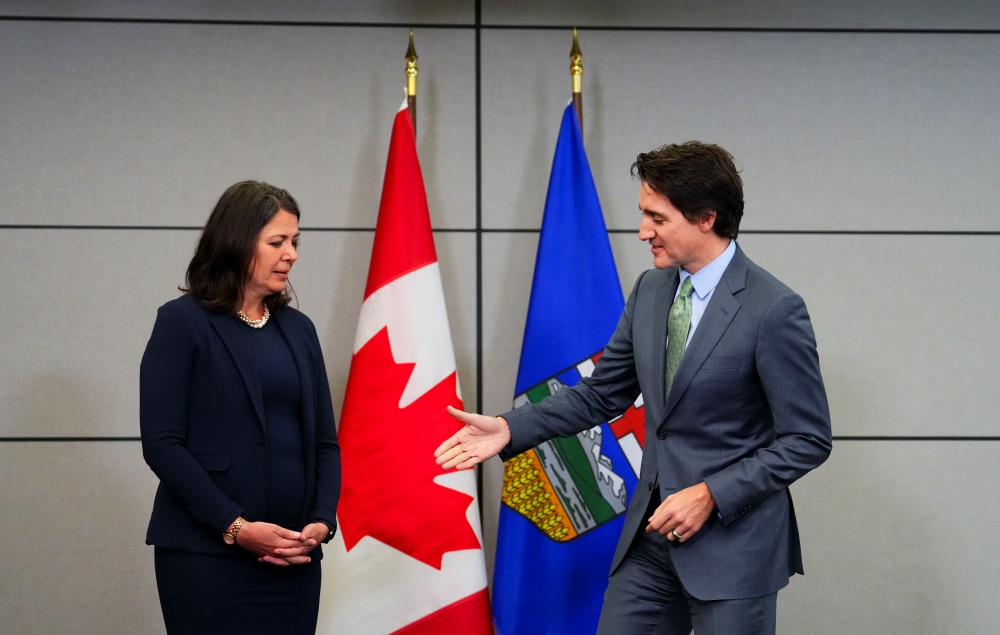The premiers asked for a pony and Justin Trudeau gave them a tricycle.
But if Canada’s premiers are feeling Christmas morning disappointment with Ottawa’s financial package intended to save the public health-care system, they aren’t resorting to the usual antics when their demands aren’t met.
The chair of the premiers’ council, Manitoba Premier Heather Stefanson, noted the significant shortfall in requested funding. Quebec Premier François Legault griped that Ottawa’s package was not a long-term solution to the problems besetting the health system.
But not a single premier came out swinging against Ottawa’s offer, not a single one turned it down — at least not yet.
Calling Ottawa’s offer “fiscally limited,” as B.C. Premier David Eby did, is the understatement of this political season. It was a country mile from being enough. The premiers had asked for $28 billion a year to be added to the Canada Health Transfer. They got $46.2 billion spread over 10 years, with just under half of that coming in the form of a boost to the Canada Health Transfer.
Another $25 billion will be doled out through bilateral deals with individual provinces and territories, with strings attached. Ottawa would like the funding to be invested in areas such as primary care and mental health.
The bilateral deals give Ottawa significant leverage in its dealing with the provinces and territories. With each side deal it is able to consummate, a unified opposition to Ottawa’s offer will be weakened. Think of it as divide and concur.
But what really puts Ottawa in the driver’s seat with this offer, should the premiers accept it, is the level of oversight the federal government will exercise. Through the Canadian Institute for Health Information, the provinces and territories will be required to share data that Ottawa will use to assess whether the new funding, such as it is, actually produces better outcomes for Canadians.
If surgical wait times don’t improve, if more doctors and nurses aren’t recruited, if more Canadians don’t end up with access to family doctors, new funding could dry up — though there are no explicit penalty clauses in the federal proposal. But why else measure performance outcomes, if failing grades don’t come with consequences?
Which raises another question. Why are normally combative premiers so careful in reacting to a deal that, after all, comes up far short of their demands, and also intrudes on a matter of provincial jurisdiction?
It comes down to this. Health care is now an existential issue for every political party. With record numbers of Canadians without a family doctor, with a shocking number of patients dying in ERs and a COVID-weary medical profession barely on its feet in overwhelmed hospitals, health care in this country is not merely in trouble, there is a clear and present danger of a collapse.
That’s why federal Health Minister Jean-Yves Duclos said the system doesn’t work anymore. That’s why no politician wants to be seen as haggling over the details of a fix, when so many Canadians are suffering, and without timely access to medical care. In Nova Scotia alone, 558 ER patients died in 2022, up 10 per cent from the previous year.
That’s why Ontario Premier Doug Ford is apparently prepared to embrace Trudeau’s insufficient financial lifeline, characterizing it as a “down payment” on better future funding from Ottawa.
Any new money is a good thing because the crisis has reached dysfunctional proportions. And Canadians don’t want their misery reduced to jurisdictional haggling between different levels of government. They want to see improvements on health-care frontlines.
That’s why Conservative Leader Pierre Poilievre, whose reflexive reaction to anything Trudeau does is shock and outrage, says he will not only honour the Liberal deal if he is elected prime minister, he will give even more money to the premiers. Even Poilievre understands that at a visceral level, Canadian identity rests on public health care, not hockey. Too bad he didn’t bother to tell Canadians just how much more he would be willing to spend if he ran the show.
One politician who was not shy about calling out the Liberal deal as too little, too late is federal NDP Leader Jagmeet Singh.
Singh, who entered into a supply and confidence deal with the Liberals that could keep Trudeau’s minority in power until 2025, has accused the prime minister of endangering Canada’s public health-care system in the most fundamental way.
“Most concerning is that, according to the premiers, Prime Minister Trudeau did not raise a single concern with provincial plans to build more for-profit, private health care. When he had the chance to stand up for Canada’s public health-care system, he stood down,” Singh said in a statement.
Even though Trudeau has repeatedly said that health care in all provinces and territories must comply with the Canada Health Act, Singh thinks Trudeau has missed the point. Rather than easing staffing problems in hospitals by having some procedures done in private clinics, the NDP believes that approach will only make matters worse.
“Private health care will cannibalize ERs and ORs…. We must move towards more public delivery, not further away,” the NDP leader tweeted.
Trudeau is not without defences against Singh’s accusations. The most obvious one is that it is the provinces, not Ottawa, that have jurisdiction over the delivery of health care in Canada. Which means that the NDP leader’s comments might be better directed at provincial and territorial premiers, rather than Trudeau.
And then there is the timing of this proposed deal. It comes at a moment of fiscal restraint in Canada, as the country tries to regain its balance after the ravages of COVID that put such pressure on hospitals, health-care workers and the federal treasury.
Nor is health care the only fiscal obligation facing the Liberal government. As Finance Minister Chrystia Freeland recently pointed out, the government is also committed to major expenditures in the battle against global warming. There is only so much to go around.
That said, Trudeau’s assessment that his health-care funding proposal will fix the system for the next 10 years is aspirational hyperbole.
In 2004, then-prime minister Paul Martin offered what he called a “generational” fix for the health-care system based on an infusion of new funding. Martin negotiated a 10-year deal worth $41.3 billion to the provinces. Trudeau is now offering a 10-year proposal that is virtually identical to Martin’s deal, with $46 billion in new funding being offered to the country’s premiers. It didn’t work then, and it won’t work now if what the politicians are talking about is a transformational change.
As the head of the Canadian Medical Association, Dr. Alika Lafontaine put it, Ottawa’s proposal offers a “ray of hope.” But it is still a long way from sunny days for Canada’s public health-care system. ![]()
Read more: Health, Federal Politics

















Tyee Commenting Guidelines
Comments that violate guidelines risk being deleted, and violations may result in a temporary or permanent user ban. Maintain the spirit of good conversation to stay in the discussion.
*Please note The Tyee is not a forum for spreading misinformation about COVID-19, denying its existence or minimizing its risk to public health.
Do:
Do not: